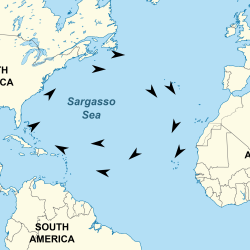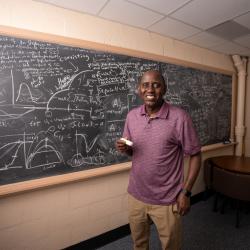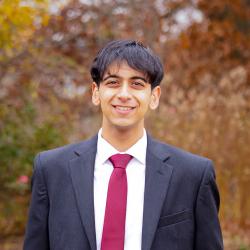Four Faculty Members in UMD’s College of Computer, Mathematical, and Natural Sciences Named 2022 AAAS Fellows
Four professors in the University of Maryland’s College of Computer, Mathematical, and Natural Sciences (CMNS) were named 2022 Fellows of the American Association for the Advancement of Science (AAAS):
- Abba Gumel
- Mohammad Hajiaghayi
- Wolfgang Losert
- Dana Nau
“I join the CMNS community in congratulating Professors Gumel, Hajiaghayi, Losert and Nau on their well-deserved election as AAAS Fellows,” said CMNS Dean Amitabh Varshney. “This is an affirmation of what we already know—that they are each pushing the boundaries in their respective fields and making a significant impact on the grand challenges our society faces today.”
UMD’s 2022 Fellows, seven in total, join a class of 506 new Fellows who have moved their fields forward, paving the way for scientific advances that benefit society. They bring diverse and novelty thinking, innovative approaches and passion that will help solve the world’s most complex problems, according to AAAS’s announcement.
“AAAS is proud to elevate these standout individuals and recognize the many ways in which they’ve advanced scientific excellence, tackled complex societal challenges and pushed boundaries that will reap benefits for years to come,” Sudip S. Parikh, AAAS chief executive officer and executive publisher of the Science family of journals, said in an announcement.
Abba Gumel

Abba Gumel joined UMD in fall 2022 as the Michael and Eugenia Brin Endowed Chair in Mathematics. He also holds joint appointments in the Department of Biology and Institute for Physical Science and Technology.
Gumel’s research primarily involves designing, analyzing and simulating mathematical models to gain insight and understanding of the transmission dynamics and control of emerging, re-emerging and resurging infectious diseases.
Some of his past research demonstrated the dynamics of dengue disease-carrying mosquitoes, the impact of quarantine on an Ebola outbreak and the ability of face masks to slow the spread of COVID-19. Last year, he was awarded the Bellman Prize at the Annual Meeting of the Society for Mathematical Biology for a paper on the links between malaria transmission and climate. In the coming years, one of Gumel’s top research goals is working toward the global ZERO by 40 initiative, which aims to eradicate malaria by 2040.
Over the course of his career, Gumel has written nearly 170 peer-reviewed research papers and received an array of awards and honors. In 2022, Gumel was named Fellow of the Society for Industrial and Applied Mathematics as well as the American Mathematical Society. He is also a Fellow of the African Scientific Institute, Nigerian Academy of Science and African Academy of Sciences.
Gumel joined UMD following faculty positions at the University of Manitoba in Canada (1999-2014) and Arizona State University (2014-22). He earned his Ph.D. in mathematics from Brunel University in the United Kingdom in 1994 and his bachelor’s degree in mathematics from Bayero University in Nigeria in 1989.
Mohammad Hajiaghayi

Mohammad Hajiaghayi, who holds the Jack and Rita G. Minker Professor of Computer Science, is a professor in the Department of Computer Science with a joint appointment in the Institute for Advanced Computer Studies. He has made significant contributions to the fields of algorithmic graph theory and algorithmic game theory.
His research and scholarship involve algorithmic game theory and combinatorial auctions, network design, combinatorial optimizations and approximation algorithms, fixed-parameter algorithms, algorithmic graph theory, distributed and mobile computing, machine learning, and computational geometry and embeddings. He has 350 refereed technical publications.
Hajiaghayi is a Guggenheim Fellow, an IEEE Fellow, an Association for Computing Machinery (ACM) Fellow, a European Association for Theoretical Computer Science Fellow and a Blavatnik Honoree. He received a University of Waterloo Alumni Achievement Medal, an Office of Naval Research Young Investigator Award, as well as a National Science Foundation CAREER Award. He was also an Amazon Scholar, a visiting research scientist at Google AI-Research and a visiting researcher at Microsoft Research. He is editor-in-chief of Algorithmica, the oldest and leading journal dedicated to algorithms, and his comprehensive book “Computational Intractability: A Guide to Algorithmic Lower Bounds’’ (MIT Press), co-authored with MIT Professor Erik Demaine and UMD Computer Sciene Professor William Gasarch, is now available at hardness.mit.edu.
Before joining UMD, Hajiaghayi was a senior researcher in the Algorithms and Theoretical Computer Science group at AT&T Labs. Prior to that, he was a one-year postdoctoral fellow in the School of Computer Science at Carnegie Mellon University and a one-year postdoctoral associate at the MIT Computer Science and Artificial Intelligence Laboratory. He received his doctorate in applied mathematics at MIT in 2005, his Master of Science degree in computer science from the University of Waterloo in 2001 and his undergraduate degree in computer engineering from Sharif University of Technology in 2000.
Wolfgang Losert

Wolfgang Losert is a professor in the Department of Physics with a joint appointment in the Institute for Physical Science and Technology (IPST).
In his research, Losert aims to discover emergent dynamic properties of complex systems at the interface of physics and biology. He currently leads a Multidisciplinary University Research Initiative program funded by the Air Force Office of Scientific Research that transformed our understanding of how cells sense their physical environment. He also serves as co-principal investigator on a Brain Research through Advancing Innovative Neurotechnologies (BRAIN) initiative center grant from the National Institutes of Health focused on information processing in sensory brain circuits.
Losert actively fosters cross-disciplinary interactions and new research and educational opportunities on campus and beyond. He helped launch and currently co-leads the American Physical Society Group on Data Science. He was part of a trans-university initiative of the Howard Hughes Medical Institute (called NEXUS) that developed new science and math courses for biology majors and pre-health care students that are being widely adopted. He led the development of and co-directs the NCI-UMD Partnership for Integrative Cancer Research, which provides UMD faculty members and graduate students the opportunity to tackle pressing problems in cancer research in collaboration with National Cancer Institute experts.
A Fellow of the American Physical Society, Losert joined UMD in 2000 as an assistant professor and served as an associate dean in CMNS (2014-22) and as interim IPST director (2019-20). He earned his Ph.D. in physics from the City College of the City University of New York in 1998 and his diplom in applied physics from the Technical University of Munich in Germany in 1995.
Dana Nau

Dana Nau is a professor in the Department of Computer Science with a joint appointment in the Institute for Systems Research who conducts research in artificial intelligence (AI), with a focus on automated planning and game theory.
He discovered pathological game trees, in which looking farther ahead produces worse decision-making, and co-authored the AI planning and game-tree search algorithm used to win the 1997 world championship of computer bridge. In collaboration with social psychologists, he uses evolutionary game theory to study the evolution of human behavioral norms such as cooperation and punishment and ethnocentrism. He also led the development of the AI planning systems SHOP, SHOP2, Pyhop and GTPyhop, which have been used in thousands of projects worldwide.
Nau is currently the lead investigator on the Learning Online Temporal Goal Networks project and a member of several other research projects including the MURI: Innovations in Mean-Field Game Theory for Scalable Computation and Diverse Applications.
He has nearly 400 refereed technical publications and has co-authored two graduate-level textbooks: Automated Planning: Theory and Practice (2004), the de facto standard textbook on AI planning, and Automated Planning and Acting (2016).
Nau is a Fellow of the Association for the Advancement of Artificial Intelligence and the Association for Computing Machinery. He received a B.S. in applied mathematics from Missouri S&T (then called the University of Missouri-Rolla) in 1974 and a Ph.D. in computer science from Duke University in 1979 before joining the UMD faculty.







